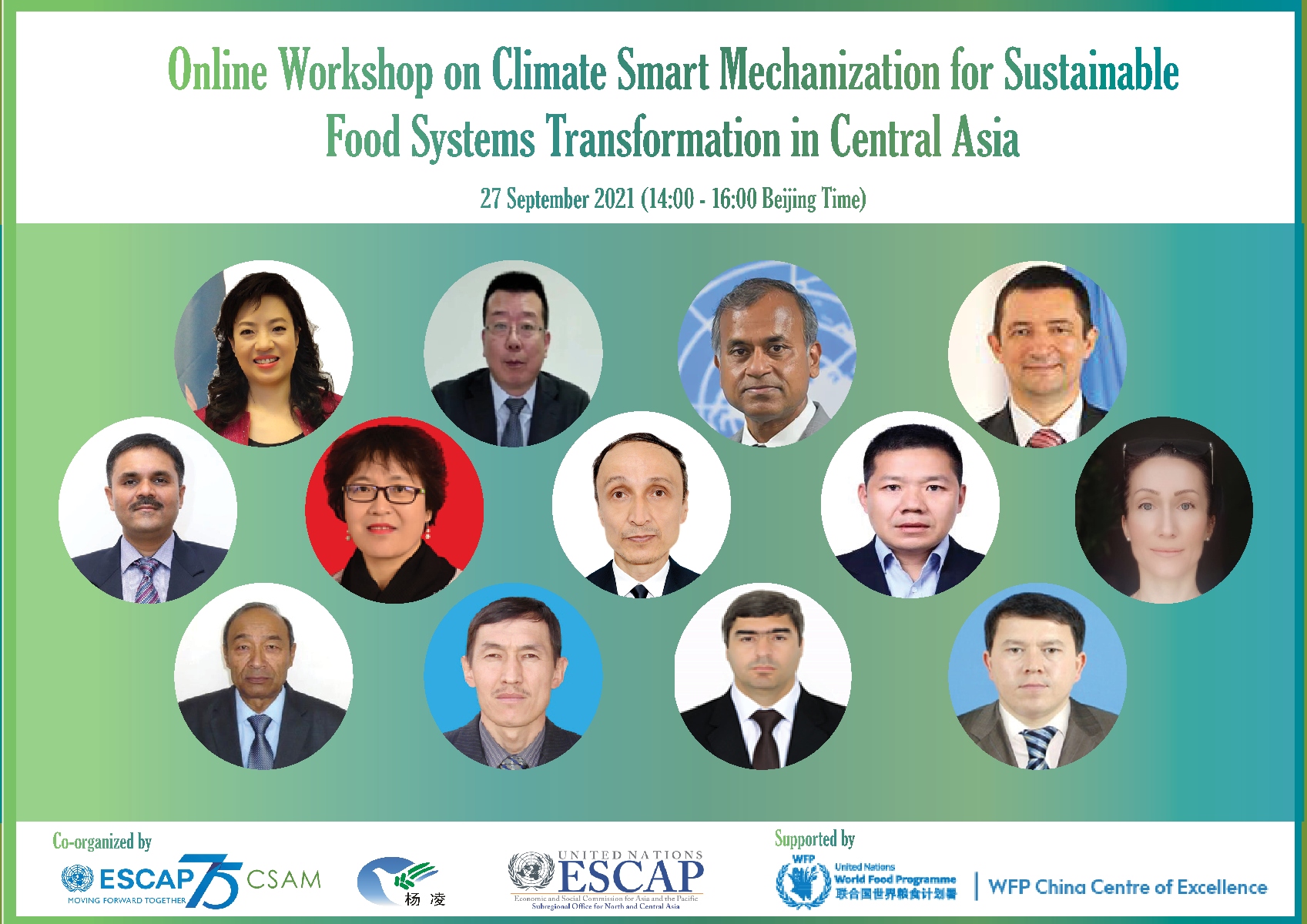ESCAP and Partners Strive to Promote Climate-Smart Mechanization for Sustainable Food Systems Transformation in Central Asia

Meeting Documents
On 27th September 2021, the Centre for Sustainable Agricultural Mechanization (CSAM) of the United Nations Economic and Social Commission for Asia and the Pacific (ESCAP) co-organized an ‘Online Workshop on Climate-Smart Mechanization for Sustainable Food Systems Transformation in Central Asia’ in collaboration with the Administrative Committee of Yangling Agricultural High-Tech Industry Demonstration Zone of the People’s Republic of China and ESCAP’s Sub-regional Office for North and Central Asia (SONCA), with the support of the World Food Programme(WFP) China Office. The workshop was well attended by participants from around the world including Central Asia, such as Kazakhstan, Kyrgyzstan, Tajikistan and Uzbekistan, Southeast Asia as well as China which has made rapid advances in recent years in the application of climate-smart mechanization technologies for agricultural development and shares geographical proximity with Central Asia.
Overall, the event provided a platform for research institutes, universities, government ministries, the private sector as well as international organizations to deliberate on how climate-smart mechanization can promote improved livelihoods of local communities, in particular vulnerable groups and smallholder farmers, in support of food systems transformation in the Central Asian context. It underscored the need for dissemination of knowledge and experiences, sharing of expertise and good practices as well as collectively identifying adaptable solutions in the domain of sustainable agricultural mechanization.
In the opening session of the workshop, Dr. Yutong LI, Head of ESCAP-CSAM, Mr. Jinqing CHENG, Deputy Director General of Administrative Committee of Yangling Agricultural High-Tech Industry Demonstration Zone of China, Mr. Nikolay Pomoshchnikov, Head of the ESCAP-SONCA, and Mr. Siddharth Chatterjee, United Nations Resident Coordinator in China delivered welcome remarks. Subsequently, professors and experts from the Representative Office for Central Asia of the International Water Management Institute, the Global Cold Chain Alliance for Central Asia, Northwest Agricultural and Forestry University of the People’s Republic of China and the Chinese Academy for Agricultural Mechanization Sciences shared innovative mechanization-based solutions and technologies as well as experiences pertaining to their introduction or scale-up for enhancing climate resilience in agriculture, especially for small and resource-poor farmers. These solutions covered diverse areas such as dryland farming, water saving technologies, green irrigation systems, post-harvest treatment as well as cold chain management. Experts from the Kazakh Research Institute of Mechanization and Electrification of Agriculture; Kyrgyz National Agricultural University; Ministry of Agriculture of Tajikistan and Uzbekistan’s Tashkent State Agrarian University further enriched the discussions by presenting their views and perspectives on the status of, and ongoing efforts to promote, climate-smart mechanization for sustainable food systems transformation in their countries.
Key takeaways from this workshop include: due regard should be paid to scaling-up the application of the proven technologies and good practices in order to transform food systems; efforts to build relevant national capacities must be reinforced; and all stakeholders must join hands to promote regional and international cooperation amongst countries both within the outside Central Asia. The event also followed the momentum of the United Nations Food Systems Summit convened on 23 September 2021 and served as one of its independent dialogues (for more information visit https://summitdialogues.org/dialogue/45171/).
